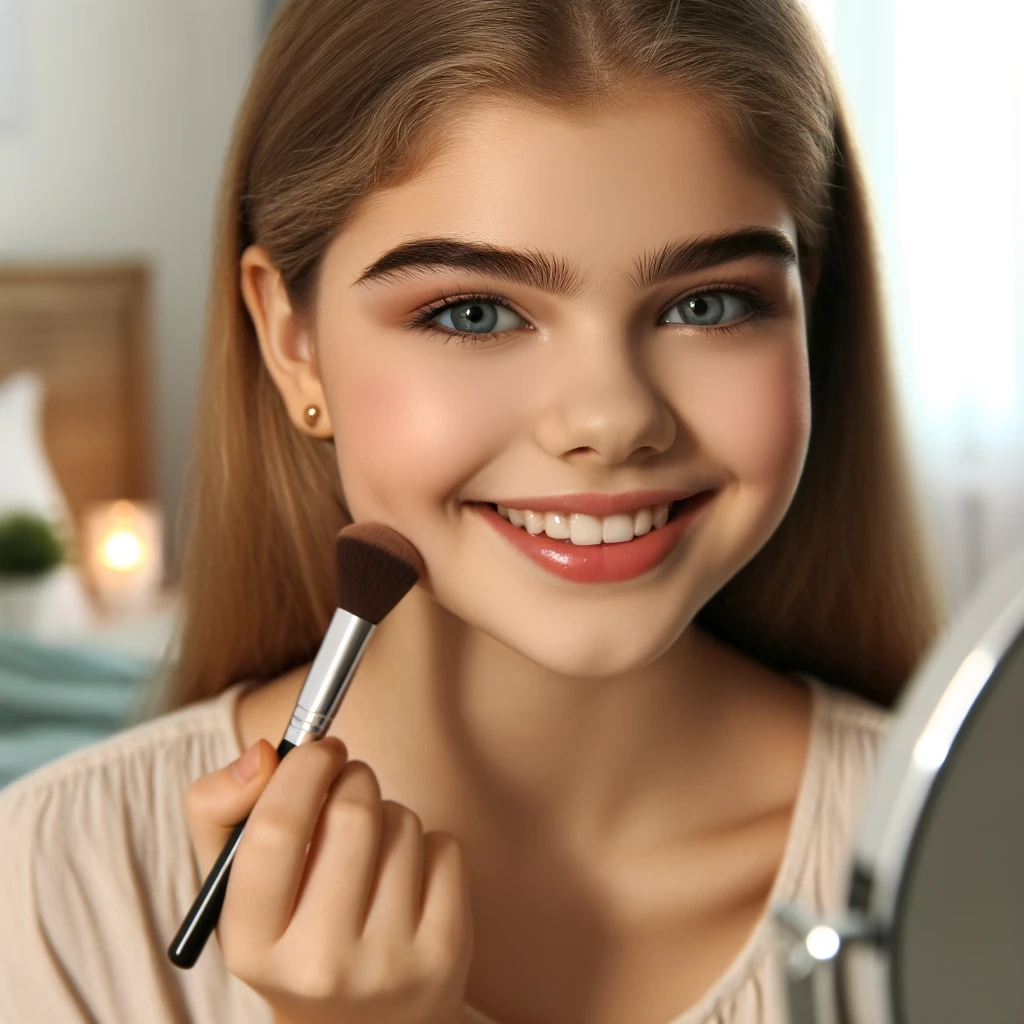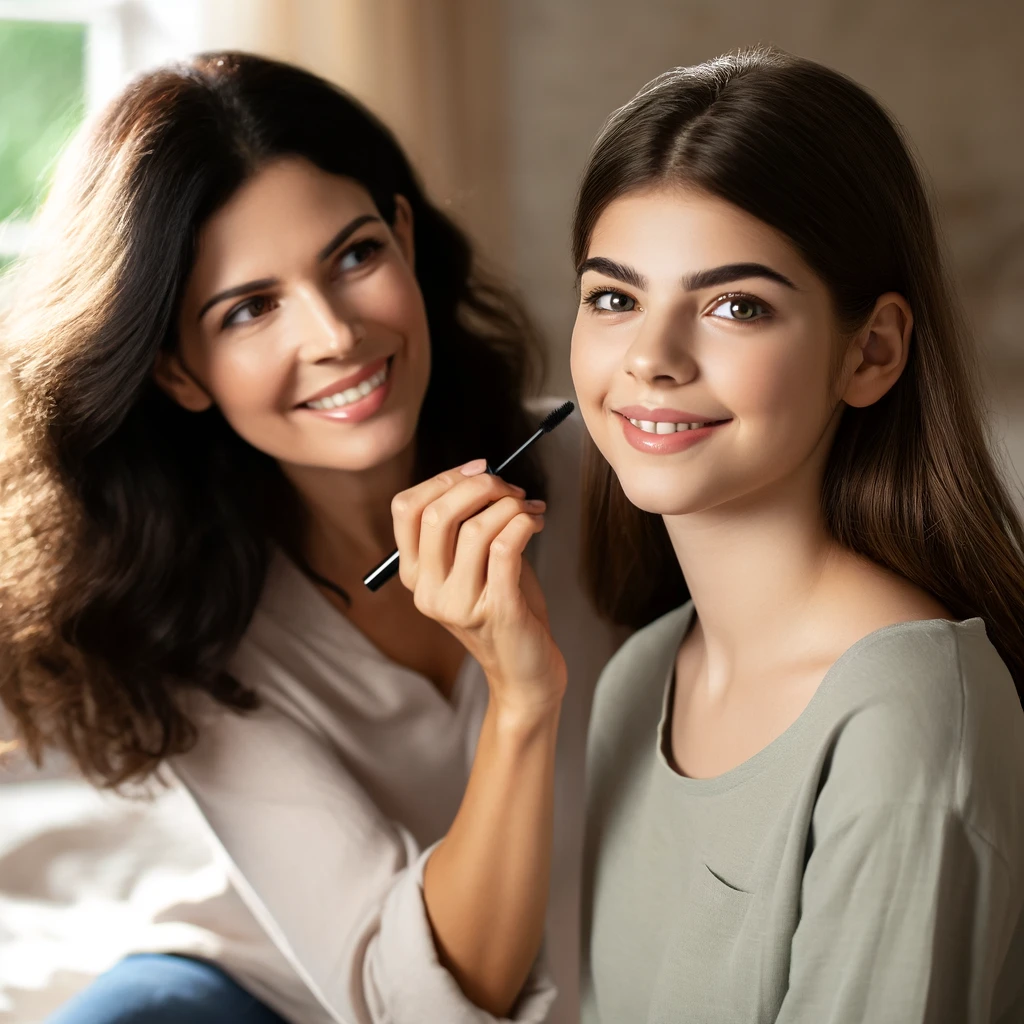In recent years, the use of makeup among teenagers has surged, largely propelled by the digital age’s icons and the omnipresent influence of social media. As teens scroll through Instagram, TikTok, and YouTube, they’re bombarded with endless images of flawless beauty, sparking a keen interest in makeup products and techniques. This blog explores the multifaceted world of teenagers and makeup, examining its appeal, the benefits it brings, and the potential risks involved.
The Appeal of Makeup to Teenagers
Makeup is not just about altering one’s appearance; it’s a form of self-expression that offers teenagers a creative outlet in their formative years. For many young people, it provides a way to experiment with their identity in a reversible and highly personal manner. Social media platforms further amplify this effect by showcasing a myriad of makeup looks, from the subtle and natural to the bold and artistic, thereby influencing a broad spectrum of styles and preferences among teens.
The allure of the best makeup is also significantly shaped by peer interactions. As teenagers observe their friends and classmates exploring different makeup styles, they are naturally inclined to try out similar looks. This peer influence is compounded by the vast array of beauty influencers on social media, whose techniques and personal brands often set the trends for millions of young followers worldwide.

Top 7 Benefits of Makeup for Teenagers
- Boosts Self-Confidence: Makeup can enhance features and cover imperfections, boosting self-esteem.
- Encourages Creativity: Applying makeup is a creative process that allows for artistic self-expression.
- Promotes Social Interaction: Makeup can be a bonding activity among peers, fostering friendships and social skills.
- Teaches Skincare: Learning about makeup often leads teenagers to learn more about proper skincare routines.
- Enhances Professional Skills: For some, makeup skills can lead to career opportunities in cosmetology and related fields.
- Cultural Expression: Makeup can be a way for teenagers to connect with their cultural heritage and celebrate it.
- Therapeutic Effects: The process of applying makeup can be calming and therapeutic for some.
For many teens, makeup is a confidence booster. It can help address insecurities and enhance features, giving a sense of pride in one’s appearance. Beyond individual benefits, makeup serves as a bonding tool among peers. Makeup parties or getting ready together for an event are commonplace in teenage social lives, facilitating deeper connections through shared interests.
Moreover, makeup allows for artistic expression. It provides a canvas on which teenagers can showcase their creativity, whether they are replicating sophisticated online trends or developing their unique styles. This artistic exploration can significantly aid in personal development and self-discovery during the teenage years.
Top 7 Potential Risks and Concerns
- Skin Problems: Frequent makeup use can lead to acne, allergies, and other skin issues.
- High Cost: Quality makeup products are expensive and can become a financial burden.
- Pressure to Conform: Social pressures can make teenagers feel they need makeup to be accepted.
- Early Aging: Some makeup products can harm the skin, potentially leading to premature aging.
- Dependency: Reliance on makeup for self-esteem can lead teenagers to feel insecure without it.
- Time Consuming: Daily makeup routines can be time-consuming and reduce productivity.
- Chemical Exposure: Many makeup products contain harmful chemicals that can be absorbed by the skin.
While makeup offers numerous benefits, it is not without its risks. The pressure to meet unrealistic beauty standards can be psychologically taxing for young individuals, potentially leading to issues with self-esteem and body image. Skin health is another concern, as the use of inappropriate products or inadequate removal techniques can lead to acne and other skin problems.
It’s crucial for teenagers to learn moderation in makeup usage and to prioritize skin health over aesthetic appeal. Understanding the ingredients and choosing products suitable for young, sensitive skin are essential skills to mitigate these risks. This knowledge also empowers teens to make informed choices about the products they apply to their bodies.

Guidance for Parents and Guardians
Navigating conversations about makeup use with teenagers can be challenging for parents and guardians. It is important to approach these discussions with openness and understanding, rather than judgment or criticism. Encouraging a healthy approach to makeup involves promoting good skin care habits, discussing the psychological aspects of beauty standards, and fostering a positive self-image.
Parents can support their teenagers by educating themselves about the safest and most appropriate makeup products and by guiding their children in choosing quality over quantity. Helping teenagers understand the value of their natural beauty, alongside their decorated personas, can be instrumental in developing a balanced perspective on makeup.
Frequently Asked Questions
Why do high schoolers wear makeup?
High schoolers often wear makeup because it lets them express themselves and boost their confidence. As they figure out their identities, makeup can be a fun way to experiment with different looks and feel more comfortable in their own skin. It’s a way to highlight what they love about themselves and sometimes, it’s just about feeling a bit more polished for the day ahead!
Is it OK for a 13 year old to wear makeup to school?
Yes, it’s generally okay for a 13-year-old to wear makeup to school, as long as it’s done in moderation and fits within any guidelines their school might have. It’s important for young teens to understand makeup as a form of self-expression rather than a necessity. When they start experimenting with makeup, it can be a good opportunity for parents or guardians to guide them on how to use it appropriately, emphasizing the importance of skincare and helping them develop a healthy self-image. This approach helps them enjoy makeup while keeping a balanced perspective on beauty.
How to do makeup for 16 year old?
When it comes to makeup for a 16-year-old, it’s best to keep it simple and enhance natural beauty. Here are some steps to create a fresh, age-appropriate makeup look:
Start with Skincare: Healthy skin is the best base for any makeup application. Encourage a routine of cleansing, moisturizing, and applying sunscreen every day. This helps create a smooth, clear surface and protects skin from damage.
Apply a Light Foundation or BB Cream: Choose a lightweight foundation or BB cream that matches the skin tone. These products help even out the complexion without looking heavy or cakey. Use a damp beauty sponge for a natural, blended finish.
Concealer for Blemishes: If there are any blemishes or dark circles, a small amount of concealer can be applied. Make sure to blend well so that it looks seamless with the base.
Natural Eyebrows: Fill in the eyebrows lightly with a brow pencil or powder that closely matches the natural brow color. The goal is to enhance the brows subtly without making them look overly drawn.
Neutral Eyeshadows: A light, neutral shade on the eyelids is perfect for everyday wear. Optionally, a slightly darker shade can be used in the crease to add depth. Remember to blend well!
Eyeliner and Mascara: A thin line of eyeliner on the top lid can define the eyes beautifully. Follow up with a coat of mascara to lift and open up the eyes. Choose brown mascara for a softer look compared to black.
Blush for a Healthy Glow: A touch of blush on the cheeks can bring a healthy, youthful glow. Peach or light pink shades work well for most skin tones. Apply lightly on the apples of the cheeks.
Lip Balm or Tinted Lip Gloss: Finish the look with a moisturizing lip balm or a tinted lip gloss. These add a hint of color and keep lips hydrated without the intensity of lipstick.
This approach keeps the makeup light and suitable for school or everyday activities, emphasizing natural beauty and comfort. Encouraging young individuals to explore makeup in a way that feels right for them can also be a fun and creative expression of their growing identity.
Conclusion
Makeup is a powerful tool in a teenager’s journey towards self-expression and social integration but should be approached with mindfulness about the psychological and physical impacts. By fostering open dialogue and informed choices, we can help ensure that makeup remains a positive influence in teenagers’ lives.